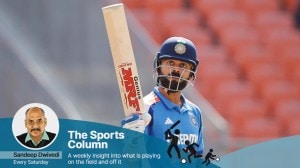Anthropologists study `Silicon Culture’ of the high-tech life
SAN FRANCISCO, NOV 17: Feel like your family members are nothing more than "drag units?" Or that your life is one long exercise ...

SAN FRANCISCO, NOV 17: Feel like your family members are nothing more than "drag units?" Or that your life is one long exercise in "chunk management?" Do you need to "ramp up" before a vacation?
If you answer yes to any of the above, you may be a part of the brave new world of high-tech life in Silicon Valley, where anthropologists are studying the evolving culture of life in the technological fast lane.
"In many ways this is a pioneering lifestyle, it’s a new culture that is being played out," said Prof Jan English-Lueck of San Jose State University, home of a 15-year-long project to put the high-tech community under the same spotlight that anthropologists have used for societies in the back of beyond.
The Silicon Valley Cultures Project, which was launched in 1991, involves in-depth study of 15 families living in northern California communities where computer makers, software engineers and Internet start-ups are defining the new economy.
At this week’s meeting of the American Anthropological Association in San Francisco, English-Lueck and colleague Charles Darrah outlined the preliminary findings of their research – describing a `Silicon Culture’ of life infused with new technology, driven by time pressures, and increasingly fractured at the family core.
"People are not actually moving faster, but they just have more to do, more decisions to make," Darrah said. "By ten O’clock in the morning, they’re often exhausted."
At the heart of the cultural change brewing in Silicon Valley is the omnipresence of technology – the laptops, cell phones, personal organizers and pagers that weave people into a complex web of constant communication.
While in the past families, friends and colleagues were forced to share social time and plan commitments at specific times, the rise of "just in time" communication between people and groups has made even the most basic planning a constant dance of negotiation and amendment, a plan-as-you-go strategy that can seem bewildering.
"The difference is the technology, and the number of things you can do because of the technology," English-Lueck said.
Multi-tasking, or working on a number of different issues at the same time, has become standard in Silicon Valley, where the researchers say a family movie outing or a school sporting event can quickly become a venue for networking, catching up on office work, or angling for the next job.
And more and more Silicon Valley residents are resorting to what the researchers call "chunk management" of their lives – using quick, often unplanned meetings with colleagues, spouses and children to establish the next game plan.
While the San Jose anthropologists have also made shorter studies of other `Silicon Cultures’ developing in places ranging from Bangalore to Taipei to Dublin, they said the rapid growth of high-tech in the San Francisco-San Jose region made it the preeminent example of how people will meld life, work and family in the digital age.
For many, the high-tech argot is already creeping in to their social lives. Some companies refer to family members as "drag units" which can limit employee productivity. Family members review personal "mission statements" about how they would like to develop. Couples "ramp up" for vacations and seek "value added" romance.
English-Lueck said that while many of the characteristics of Silicon Valley life were also becoming visible in other groups and communities, the centrality of technology to Silicon Valley workers set them apart from the career-driven denizens of Hollywood or Wall Street.
"The consumers of technology in Silicon Valley are also the producers of technology – this gives them a different relationship to it," she said. "Even people here who are users, not producers, can be effected by the romance of technology."



- 01
- 02
- 03
- 04
- 05




























